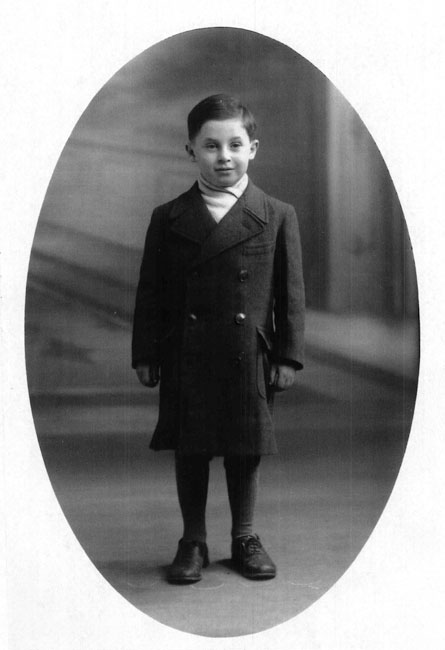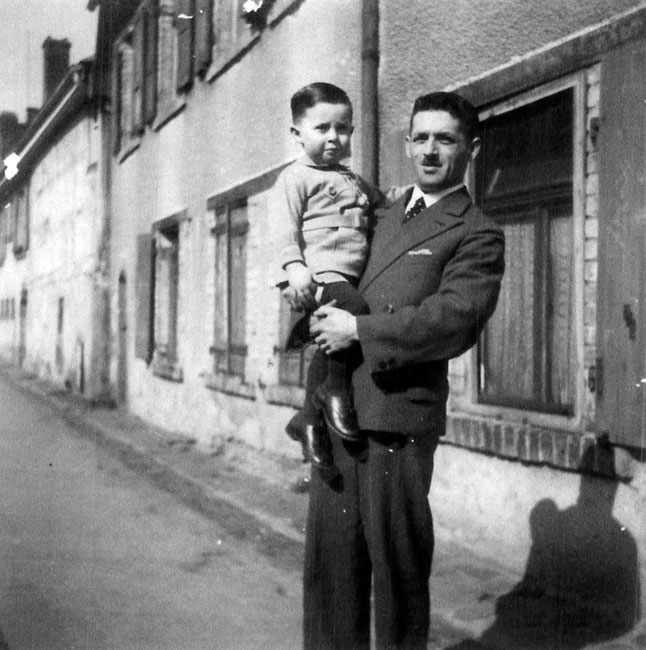In a world of total moral collapse during the Holocaust, there was a small minority who mustered extraordinary courage to uphold human values. These were the Righteous Among the Nations. They stand in stark contrast to the mainstream of indifference and hostility that prevailed during the Holocaust. Contrary to the general trend, these rescuers regarded Jews as fellow human beings who came within the bounds of their universe of obligation.
This piece highlights one story of Righteous Among the Nations, in an effort to recognize these heroic individuals. For educators, this topic lends itself well to a diverse classroom, as it includes groups other than Jews, and makes the topic more accessible to a larger group of students.
Jules & Jeanne Roger & mother Louise Roger - France
Herbert Odenheimer was born in Buehl, Bade, Germany in 1934. A child when World War II began, Herbert never forgot Kristallnacht when the synagogue was set on fire, and his family’s home was attacked. In October 1940, when he was six years old, Herbert and his family were taken from their home, deported to the south of France, and detained at the Gurs detention center, close to the Spanish border. Conditions in the overcrowded camp were terrible. There was a constant shortage of water, food, and clothing; the barracks where the inmates were housed were primitive and lacked basic facilities; sanitary conditions were deficient and the camp was plagued by epidemics. Hundreds of inmates died of typhoid fever and dysentery, among them Herbert's grandmother. In February 1941, the Jewish aid organization for children, OSE, managed to take Herbert and other children out of the camp. Agreeing to part from their only son and to trust strangers to take care of him was probably the hardest decisions Herbert’s parents could make. They never heard from or saw their child again. A year and a half later, in the summer of 1942, Hugo and Julchen Odenheimer, Herbert’s parents, were deported to Auschwitz where they were murdered.
While in the hands of the OSE, Herbert’s name was changed to a French name – Hubert Odet – and he had to shed his former identity, to learn French and seem like a French child. He spent the first month in a children’s home in Chabannes, suffering immensely from the separation from his parents. The OSE moved him from one institution to another, always fearful of being caught. In late 1942, after there were more frequent round-ups of Jews, it was decided that it would be safer to place the children with families. Hubert was not treated well by the first family he lived with. He did not complain and tried to be obedient, but when the OSE social workers came to see him they decided to move him immediately to another family - to the home of Jules and Jeanne Roger in Buzancais.
Jules Roger was a butcher and an active member of the resistance. Although he and his wife, Jeanne, had a ten-year-old son, the couple opened their home to fugitive underground members and Jews. The underground used the Rogers’ home to hide weapons and documents, and, frequently, to shelter operatives. Hiding a Jewish child put them in even greater danger. Food was rationed and the family shared what they had with those to whom they gave shelter. In order to buy extra provisions, Madame Roger began an ironing business. The Rogers displayed exemplary devotion to all those who lived with them. They constantly worked to make the children feel better even though they were separated from their parents.
With the Roger family Hubert found a warm and welcoming home, but this was not to last. As the situation became increasingly dangerous, he would be moved to different places for several weeks, before being returned to the Rogers’ house. In late 1943, when informers threatened to denounce Jules Roger, Hubert was taken to Jules’ mother, Louise Roger, in Argy, a small adjacent village. There he lived on the grandmother’s farm, tended the goats, enrolled in school, and -- to hide his Jewish identity -- Hubert became an altar boy. He wanted to be Catholic like all of his friends, but the Rogers explained that he must not deny his origins, and should be proud of them. After the war he was returned to the Roger family, where he stayed until he was put in the charge of the Jewish welfare organizations. Hubert was put into a children's home. The war was over and the children were waiting for their parents or relatives to come and get them. Every day children left accompanied by family, but no one came for Hubert. Later he learned that his mother had been deported on 4 September 1942 to Auschwitz, and his father was put on a transport three days later. Both were murdered. In 1946 Hubert was sent to stay with distant relatives in Switzerland. He had to relearn his mother tongue – German, and his family name was changed again, to Loeb. When he emigrated to Israel he adopted a Hebrew name: Ehud Loeb. Yad Vashem knows of another child that was hidden by the Rogers. Léopold Lazare was four years old when he found shelter with the Rogers after his family had been sent to Buchenwald and the OSE had removed him from the Rivesaltes camp. Lazare lived with the Rogers until the end of the occupation. He regarded the Rogers as his parents, and was reluctant to part with them when his parents reclaimed him after the war.
On May 7, 1989, Yad Vashem recognized Jules and Jeanne Roger as Righteous Among the Nations.
On December 7, 2008, Yad Vashem recognized Louise Roger as Righteous Among the Nations.










